Team USA’s Megumi Field
Megumi Field’s dream of reaching the Olympics comes true as she goes for the gold in artistic swimming.
By Lynda Lin Grigsby, P.C. Contributor
Megumi Field can see success.
It’s part of her training routine as a U.S. Olympian competing in artistic swimming (formerly synchronized swimming). As you read this, Megumi Field, 18, is likely back home in the U.S. following her Paris stay in the Olympic Village. But she has a shiny new piece of hardware, the result of a lifetime’s dedication to her sport: an Olympic silver medal, the first earned by Team USA since 2004. The team competitions are over, but she will also compete in duet artistic swimming (at press time, this event had yet to be completed).

Counting down the days before the Paris Olympic Games
Before bed, on the bus ride to the pool, and in interludes when she is not in the water with her teammates, she visualizes how her toes should point or what count she should emerge from the water in synchronicity with her teammates.
Her dedication to the sport is part of the athlete’s nature, said Anna Field, her younger sister. “I guess it’s just how she’s just wired.”
It’s also one of the reasons why the U.S. artistic swimming team is in Paris. The last time the U.S. artistic swimming team qualified for the Olympics was in 2008. That year, Megumi Field, a Shin Nisei, was a 2-year-old floating in the pool at her family’s Delaware condo.
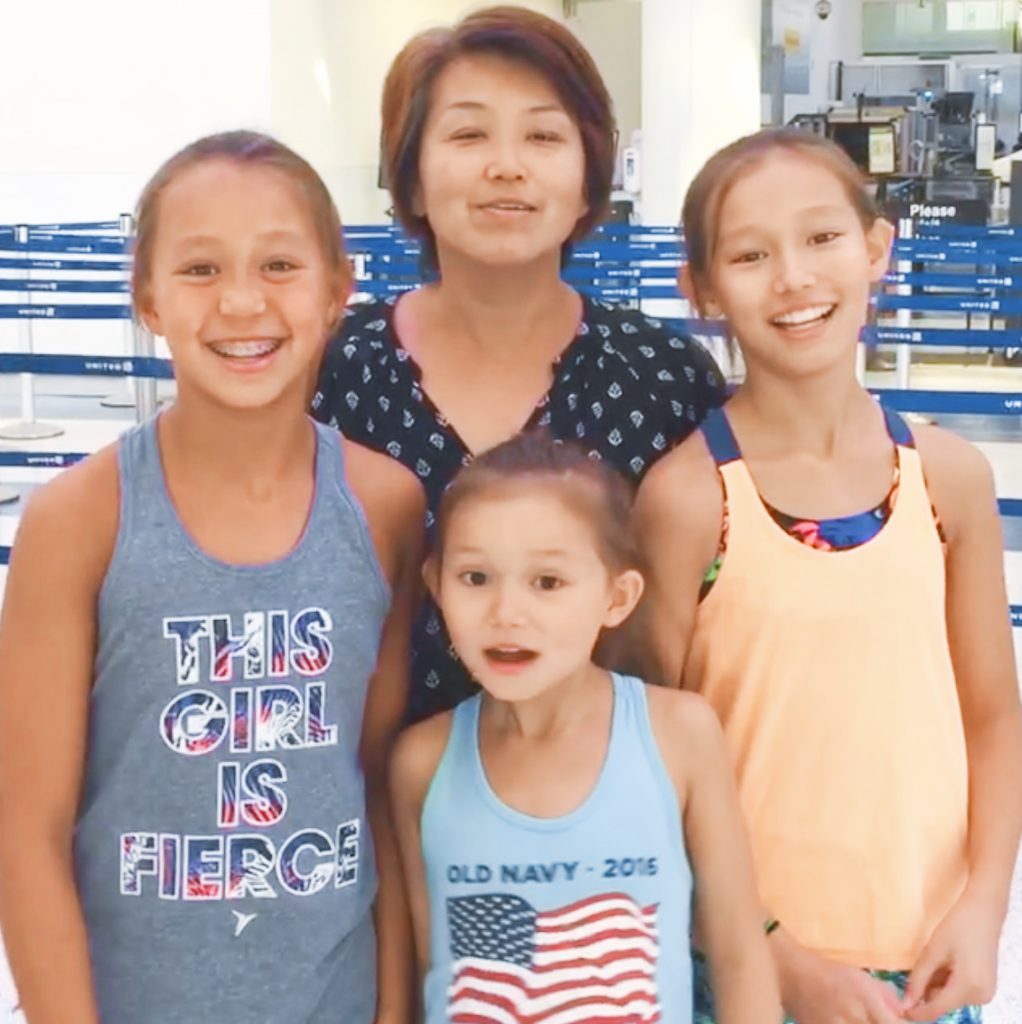
Megumi Field (left) with her sisters, Kanako (center) and Anna with mom Naomi Field (Photo: Courtesy of Naomi Field)
“She was a good floater,” said Naomi Field, her mother with a laugh. But back in the recesses of her mind, Naomi Field thought about the elegance and poise of the synchronized swimmers she loved to watch on TV in her native Japan.
Why not enroll Megumi in an artistic swimming class? Naomi Field thought. It could be fun!
The closest artistic swimming class for kids was in Pennsylvania — a one-hour drive away.
“Yeah, I know it was crazy,” said Naomi Field about the commute.
At 5 years old, Megumi Field started artistic swimming. What started as a fun pastime turned into a lifelong passion. She won competitions until she arrived at the competition of a lifetime in Paris.
Today’s artistic swimming isn’t the sport you grew up with. The modern version demands athleticism and acrobatic skills. Megumi Field is one of the six in the water providing a solid foundation for the designated team flyer to soar through the air.
On land, the team practices CrossFit to build strength. In the water, the lifts are predicated on team unity. If one person’s counting is even slightly off, the lifts could fail.
When I talked to the athlete by video, she just got back from a competition in Budapest (where the U.S. took first place in technical team. No big deal). Megumi Field is glowing from the competitive confidence boost.
During our conversation, she talked about the spirit of competition, the importance of holding on to culture and a video we found on the internet that could predict her second career path.
Lynda Lin Grigsby for the Pacific Citizen: What do you think are the chances of the U.S. team medaling in artistic swimming?
Megumi Field: Pretty good! Sometimes you know, we like to think about that. We’ve been to a fair share of competitions, so whenever we focus on the result, we tend to not do as well. We like to just go out there and show the best we can, and oftentimes, that ends up with a little piece of hardware.
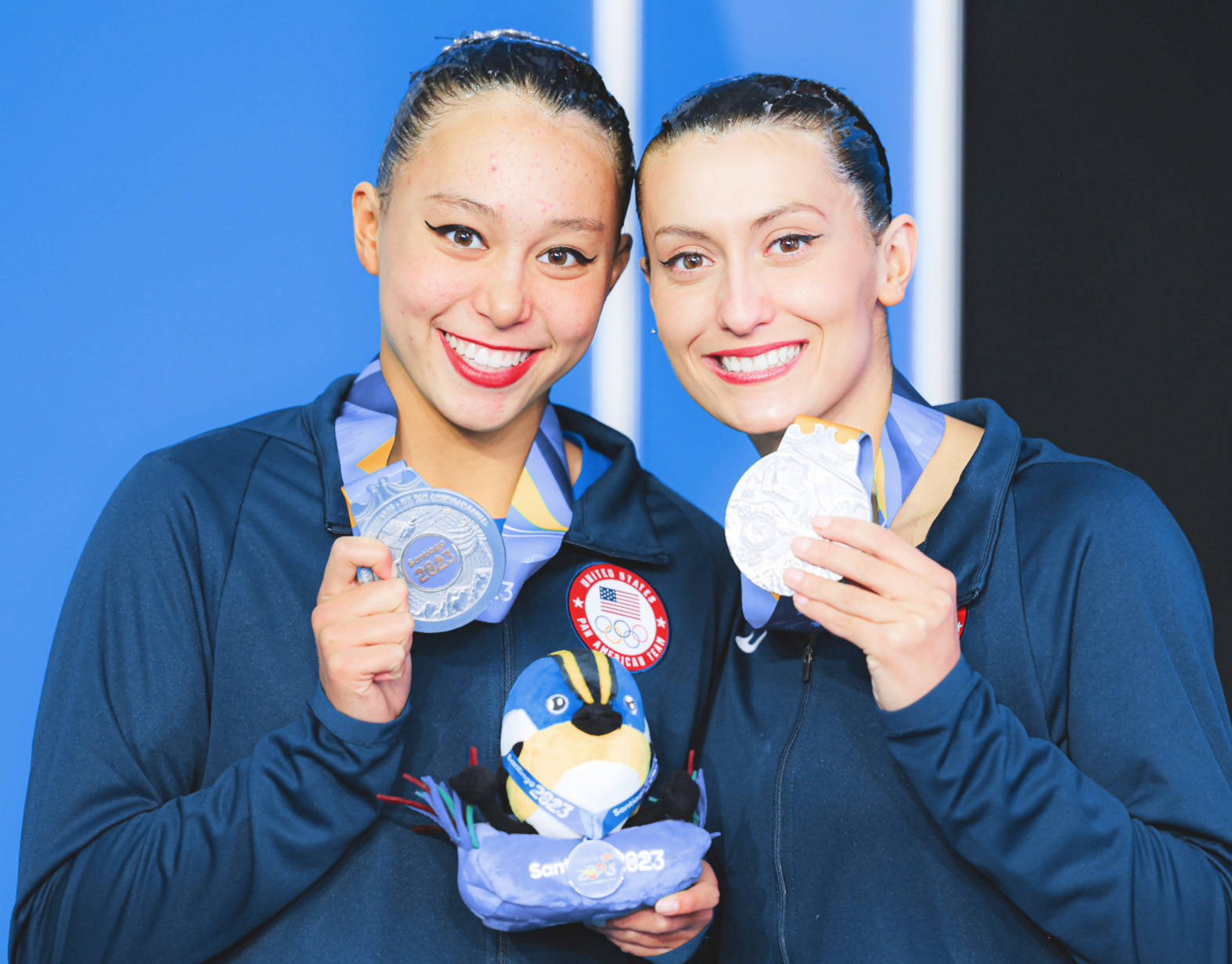
Performing with duet partner Jaime Czarkowski (Photo: Courtesy of USA Artistic Swimming)
The P.C.: You’ve only been swimming with your duet partner, Jaime Czarkowski, for a little over two months. How does it feel?
Field: We’ve been swimming together as a team for about three years. As a duet, this is the first time (swimming with Jaime), and it’s really different from our competitors. Our competitors from the top four countries are twins, so they’ve been swimming together since gestation.
I love swimming with [Jaime]. I think we really match personality-wise. And we’ve been roommates for a while, so we really enjoy each other’s company. I feel like we’re both very, very hard workers. Even way before we started swimming duet, whenever there was a competition that needed swimmers to pair up, the coaches would always put us together to fight for the extra bit of competitiveness. It’s really nice to be able to swim with her. I think we keep each other striving for more.
The P.C.: There is an old video your mom posted of you and your sisters in kimonos singing and playing the koto. Could this be your backup career?
Field: (Laughs) In Philadelphia, there was something called a Sakura Festival. We were always invited to perform. I think that video is from us practicing for one of those festivals.

When she was younger, Megumi Field attended school in Japan every summer. She is pictured here in 2012. (Photo: Courtesy of Naomi Field)
I actually was in a Japanese school when I lived in Delaware. I always talk to my mom in Japanese. Every summer from zero to 9 [years old], I went to Japan for three months. Japanese school was still in session, so I would go to school in Japan for two months.
Japanese culture emphasizes discipline. I think that has really helped me in staying disciplined and knowing what I want and what I need to do to get what I want.
The P.C.: When did you know that you had exceptional talent in artistic swimming?
Field: At my first meet in Delaware, I didn’t do well, but I wanted to go to the Olympics. My mom said, ‘You’re not going to get to the Olympics by just going to practice and not doing extra.’ That’s when the discipline and the extra practice and things started. I joined my first 12 and under national team. That’s when I started thinking, maybe I can.
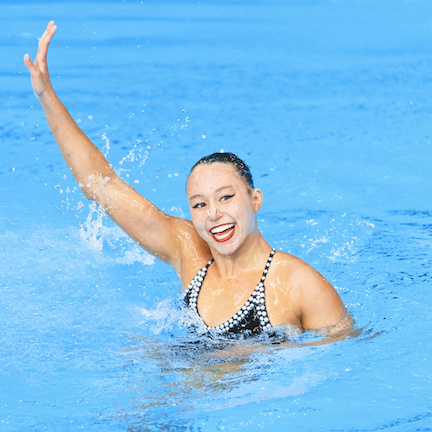
Megumi Field has dedicated her life to her sport of artistic swimming.
In Delaware, with my club, I made it to the finals of solos in the Junior Olympics. It was the first time in the history of the club that someone made it to the finals. My mom was super happy that I got fifth in the entire country.
I think that’s when I really started to be like, ‘OK, maybe I have something.’ Then, I came to California. My first year here, at Junior Olympics, I ended up getting first in every event I did. Then I was like, ‘Oh, OK, I can actually do this.’ (She was 10 years old.)
The P.C.: Halfway through eighth grade, you started online schooling and missed rites of passage like prom and homecoming. Do you regret that?
Field: I missed it all. But my coach used to say, ‘Sacrifice for what you want or what you want becomes the sacrifice.’ I didn’t go to all these milestones, but what I wanted was the Olympics. There might have been a sacrifice, but I’d rather sacrifice that than the Olympics.
The P.C.: Attending the Opening Ceremony is likely better than a dance in a sweaty gym.
Field: Exactly.
The P.C.: What are your precompetition rituals?
Field: Visualize. Right before we have a little circle. We all have like partners that we always sit across from. I always look at Jaime. We’re in a little circle with the music playing, and teammates are visualizing and ‘land drilling,’ which is going through the movement and the routine with your hands.
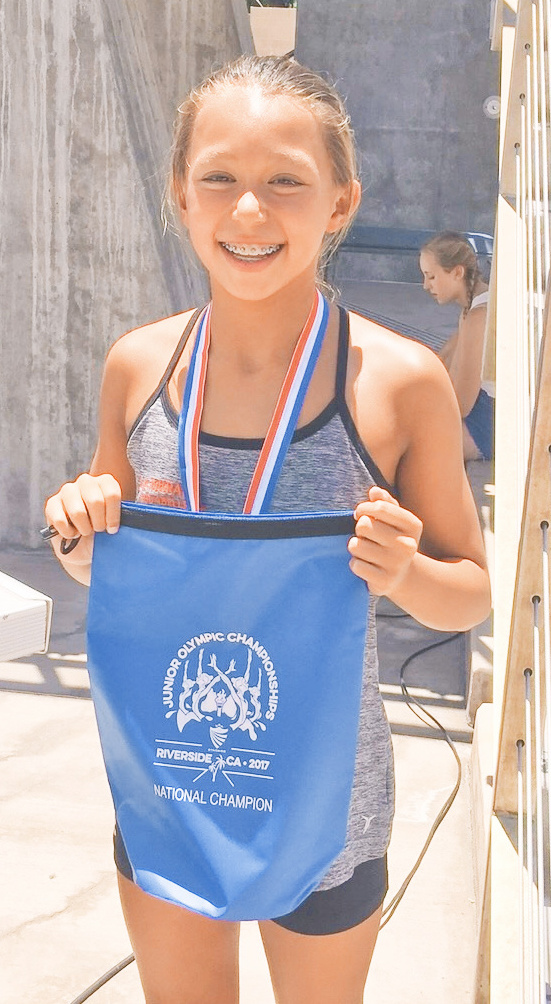
Megumi Field at the 2017 Junior Olympic Championships in Riverside, Calif. (Photo: Courtesy of Naomi Field)
That creates like a little connection moment in our little circle where it doesn’t matter what’s going on outside. We’re just looking at our partner and focusing in. Then after that, we get into a circle, and we breathe together like holding hands. We have a little cheer, and then you go out there and compete.
The P.C.: You are attending Stanford University in the fall. What’s Megumi in college going to be like?
Field: I’m so excited to go to college just because it is my first time in a classroom since eighth grade! I’m just so excited to be around people my age, who are on such completely different life paths. I think Megumi in college will be a very happy gal.
The P.C.: What are your plans right after competition?
Field: I’m staying in France for an extra five days. I’ve been before, but always for competition. I want to eat a croissant and enjoy it fully.
The P.C.: What advice do you have for Asian American kids who want to compete in artistic swimming like you?
Field: To the future generation of Asian American kids: Just go out there and have fun because artistic swimming is amazing.
It Takes Two
Following their silver medal-winning team performance in Paris, the U.S. artistic swimming duet team of Megumi Field and Jaime Czarkowski is set to take the pool after their team performances.
Aug. 9 — Duet technical routine
Aug. 10 — Duet free routine
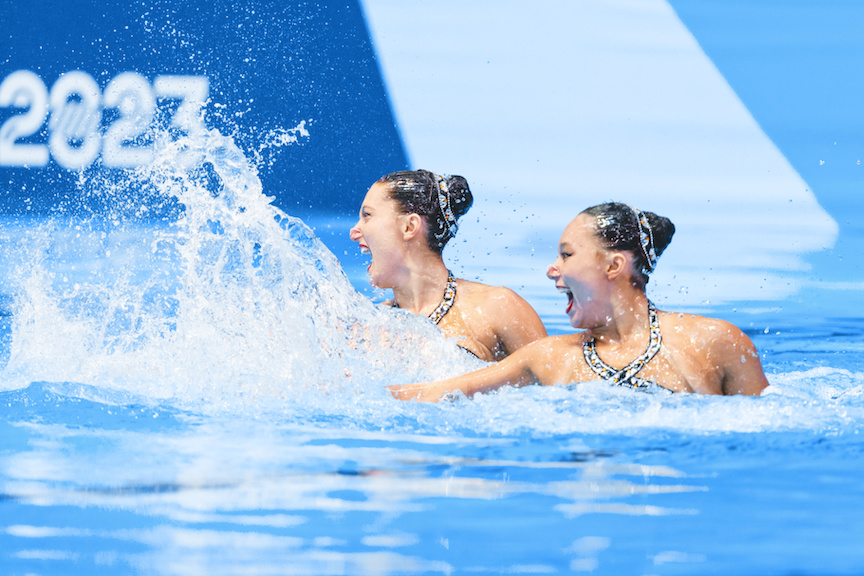
Performing with duet partner Jaime Czarkowski (Photo: Courtesy of USA Artistic Swimming)




